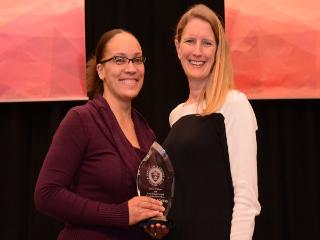June 2, 2015
Faculty Mentor Rhianna Rogers Receives Hall Award for Innovation

Rhianna Rogers with her award (left) is congratulated by President Merodie Hancock.
Rhianna Rogers, an assistant professor with the college’s Buffalo-Cheektowaga location, is the 2015 recipient of the James William and Mary Elizabeth Hall Award for Innovation.
Over the last five years, Rogers, a mentor in Cultural Studies and co-convener of the Interdiscplinary Studies Area of Study, has impacted the culture and student engagement at her center visibly, according to colleagues. In collaboration with student researchers, she spearheaded a study – the Buffalo Project – to investigate cultural understanding among students at their location. This investigation was intended to determine a correlation between cultural understanding and academic performance, retention and persistence. The results of that work informed some innovative and significant changes undertaken at the center to improve the student experience. She also was instrumental in helping establish and guide the location’s first-ever student club. Her efforts in moving these initiatives forward are described as “Herculean” by one of her colleagues, and the stronger, more engaged student community that has resulted is credited to her efforts.
“I congratulate Rhianna Rogers for winning the James W. and Mary Elizabeth Hall Award for Innovation,” said Merodie A. Hancock, president of the college. “The large number of candidates, the rigorous selection process and the high standards and accomplishments – in terms of teaching, mentoring, scholarship, innovation and community service recipients must achieve – is very impressive. These are people who best represent the aspirations of the college community. They have contributed their talents, passions and, often, their entire careers, to their colleagues, to higher education and adult learning, the communities where they live and work and, most importantly, to the overall success of the college and its students. Rhianna is an outstanding member of the faculty and an inspiration to all of us.”
“I am very honored and humbled by this award,” Rogers said. “I believe the Buffalo Project is very much a community-based effort. I would like to dedicate this award to all of the students who participated in the development of this study, the administration, faculty and staff at the Niagara Frontier Center, who have helped these students gain a voice in our center, and the community organizations who let me speak to the importance of cultural awareness and having a voice in the changing culture of the greater Buffalo region.”
Rogers expressed specific gratitude to her assistants, Maria Tripi (2010-2013) and Vincent Caito (2010-11), and her U.S. History through Ethnology students from 2010-12, who co-developed the original survey materials. She also thanked director of Academic Review Aimee Woznick, who was Rogers’ co-principal investigator, co-presenter and co-author for the last year of this project.
Rogers received her award at the annual SUNY Empire State College’s All College Conference held in Saratoga Springs, N.Y.
About the Hall Award for Innovation
The James William and Mary Elizabeth Hall Award for Innovation is given periodically to a college employee who creates, or puts into effect, an innovation that advances Empire State College’s mission and benefits the college’s students.
About SUNY Empire State College
Empire State College, the nontraditional, open college of the SUNY system, educates more than 20,000 students worldwide at eight international sites, more than 35 locations in the state of New York, online, as well as face to face and through a blend of both, at the associate, bachelor’s and master’s degree levelshe average age of an undergraduate student at the college is 35, and graduate students’ average age is 40. Most Empire State College students are working adults. Many are raising families and meeting civic commitments in the communities where they live, while studying part time.In addition to awarding credit for prior college-level learning, the college pairs each undergraduate student with a faculty mentor who supports that student throughout his or her college career.
Working with their mentors, students design an individual degree program and engage in guided independent study and course work onsite, online, or through a combination of both, which provides the flexibility for students to choose where, when and how to learn.
Students have the opportunity to enroll five times during the year.
The college’s 73,000 alumni are active in their communities as entrepreneurs, politicians, business professionals, artists, nonprofit agency employees, teachers, veterans and active military, union members and more.
The college was first established in 1971 by the SUNY Board of Trustees with the encouragement of the late Ernest L. Boyer, chancellor of the SUNY system from 1970 to 1977.
Boyer also served as United States commissioner of education during the administration of President Jimmy Carter and then as president of the Carnegie Foundation for the Advancement of Teaching.
More information about the college is available at www.esc.edu.
Media contact: David Henahan, director of communications
518-587-2100, ext. 2918
David.Henahan@esc.edu
518-321-7038 (after hours and on weekends)
